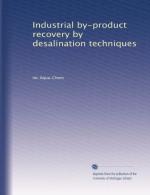|
This section contains 710 words (approx. 3 pages at 300 words per page) |

|
Approximately 97% of Earth's water is either sea water or brackish (salt water contained in inland bodies), both of which are undrinkable by humans. Desalination is the process of removing salt from seawater. Natural desalination occurs as a part of the hydrologic cycle as seawater evaporates. Manipulated desalinization—desalting, or saline water reclamation—is an energy expensive alternative to natural desalination.
Sea water contains 35,000 parts per million (ppm) (3.5% by weight) of dissolved solids, mostly sodium chloride, calcium and magnesium salts. Brackish water typically contains 5,000-10,000 ppm dissolved solids. To be consumable, or potable, water must contain less than 500 ppm dissolved solids. The method used to reach this level depends on the local water supply, the water needs of the community, and economics. Growing populations in arid or desert lands, contaminated groundwater, and sailors at sea all created the need for desalting techniques.
In the fourth century B.C., Aristotle...
|
This section contains 710 words (approx. 3 pages at 300 words per page) |

|


